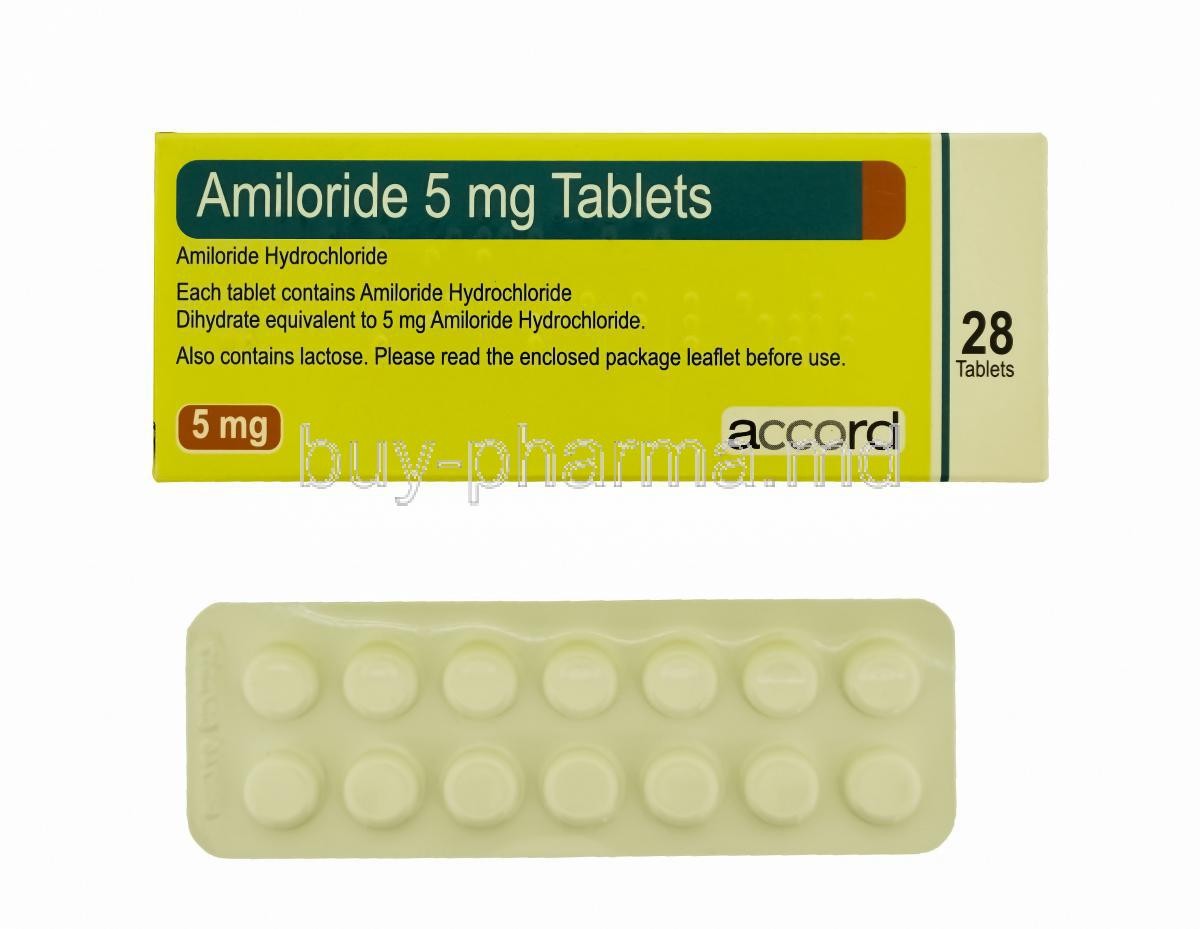
Amiloride – Oral, Midamor
Warning: This medication can cause high potassium levels (hyperkalemia). It is more likely to occur in older adults and patients with kidney disease, diabetes, or a serious illness. Potassium levels must be closely monitored while taking this medication. Very high potassium levels can sometimes be fatal. Tell your doctor immediately if you develop symptoms of high potassium levels, including muscle weakness, slow/irregular heartbeat, numb/tingling skin.
Uses: Amiloride is used with other diuretics (such as furosemide, hydrochlorothiazide) to treat high blood pressure, heart failure, or edema. It also helps to treat or prevent low blood potassium levels caused by other diuretics. Lowering high blood pressure helps prevent strokes, heart attacks, and kidney problems. Amiloride is a diuretic that causes your body to get rid of extra salt and water while also preventing the kidneys from getting rid of too much potassium.
How to Use: Take this medication by mouth with food, usually once daily or as directed by your doctor. If you take it too close to bedtime, you may need to wake up to urinate. It is best to take this medication at least 4 hours before bedtime. The dosage is based on your medical condition and response to treatment. Use this medication regularly to get the most benefit from it. Take it at the same time each day. Continue taking this medication even if you feel well. Most people with high blood pressure do not feel sick. Tell your doctor if your condition does not improve or if it worsens.
Side Effects: Headache, dizziness, nausea, vomiting, loss of appetite, stomach/abdominal pain, gas, or diarrhea may occur. If any of these effects persist or worsen, tell your doctor or pharmacist. When given with other diuretics, amiloride may cause a loss of too much body water and salt/minerals. Tell your doctor immediately if you have symptoms of dehydration or mineral loss. Tell your doctor immediately if any rare but serious side effects occur. This is not a complete list of possible side effects. Contact your doctor or pharmacist if you notice other effects not listed above.
Precautions: Before taking amiloride, tell your doctor or pharmacist if you are allergic to it or if you have any other allergies. This product may contain inactive ingredients that can cause allergic reactions or other problems. Talk to your pharmacist for more details. Before using this medication, tell your doctor or pharmacist your medical history, especially of: untreated salt/mineral imbalance, kidney disease, liver disease, diabetes, dehydration. Before having surgery, tell your doctor or dentist about all the products you use. This drug may make you dizzy. Do not drive or operate machinery until you are sure you can do so safely. Limit alcoholic beverages. Loss of body water from sweating, vomiting, or diarrhea can lower your blood pressure and worsen dizziness. Drink plenty of fluids to prevent dehydration. This drug may increase potassium levels in your blood. Limit foods high in potassium. Consult your doctor or pharmacist before using any products containing potassium. During pregnancy, use this medication only when clearly needed. It is unknown if this drug passes into breast milk. Discuss the risks and benefits with your doctor.
Drug Interactions: The effects of some drugs can change if you take other drugs or herbal products at the same time. This can increase your risk for serious side effects or may cause your medications not to work correctly. Your doctor or pharmacist can often prevent or manage interactions. Be sure to tell your doctor and pharmacist about all the products you use before starting treatment with this product. Some products that may interact with this drug include lithium, sodium phosphate products, and other products that may increase potassium levels. Check the labels on all your medicines because they may contain ingredients that could increase your blood pressure or reduce the effect of this medication. This medication may interfere with certain laboratory tests. Make sure laboratory personnel and all your doctors know you use this drug.
Question
Overdose: If overdose is suspected, contact a poison control center or emergency room immediately. Symptoms of overdose may include severe dizziness, fainting, slow/irregular heartbeat. Notes: Do not share this medication with others. Lifestyle changes such as stress reduction programs, exercise, and dietary changes may increase the effectiveness of this medicine. Laboratory and/or medical tests should be performed from time to time. Check your blood pressure regularly while taking this medication. Missed Dose: If you miss a dose, take it as soon as you remember. If it is near the time of the next dose, skip the missed dose and resume your usual dosing schedule. Storage: Store at room temperature away from light and moisture. Protect from freezing. Keep all medicines away from children and pets. Do not flush medications down the toilet or pour them into a drain unless instructed to do so. Properly discard this product when it is expired or no longer needed.


